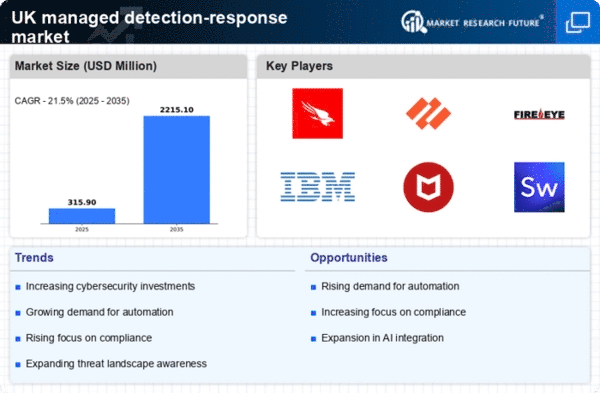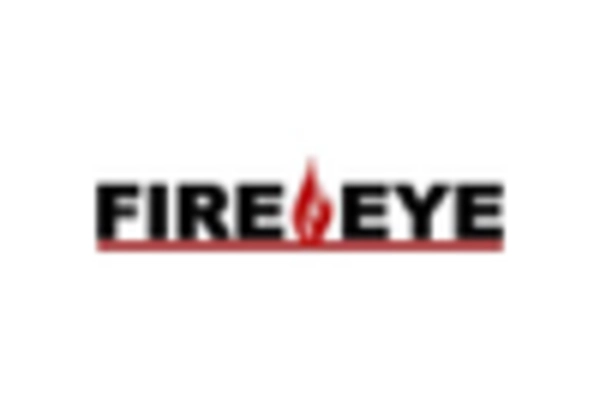Rising Cyber Threat Landscape
The managed detection-response market is experiencing growth due to the escalating cyber threat landscape in the UK. With cyberattacks becoming increasingly sophisticated, businesses are compelled to adopt advanced security measures. Reports indicate that cybercrime costs the UK economy approximately £27 billion annually, highlighting the urgent need for effective detection and response solutions. As organizations face threats from ransomware, phishing, and other malicious activities, the demand for managed detection-response services is likely to surge. This trend suggests that companies are prioritizing cybersecurity investments to safeguard their assets and maintain customer trust. Consequently, the managed detection-response market is positioned to expand as firms seek to mitigate risks associated with cyber threats.
Increased Regulatory Pressures
The managed detection-response market is influenced by heightened regulatory pressures in the UK. Organizations are required to comply with various data protection regulations, such as the General Data Protection Regulation (GDPR) and the Data Protection Act 2018. Non-compliance can result in substantial fines, reaching up to £17.5 million or 4% of annual global turnover, whichever is higher. As a result, businesses are increasingly turning to managed detection-response services to ensure compliance and protect sensitive data. This trend indicates a growing recognition of the importance of robust cybersecurity measures in meeting regulatory requirements. The managed detection-response market is likely to benefit from this shift as companies seek to enhance their security posture and avoid potential penalties.
Shift Towards Cloud-Based Solutions
The managed detection-response market is witnessing a shift towards cloud-based solutions, driven by the increasing adoption of cloud technologies in the UK. As organizations migrate their operations to the cloud, they require specialized security services to protect their cloud environments. The cloud security market is projected to grow at a CAGR of 15% from 2025 to 2030, indicating a strong demand for managed detection-response services tailored for cloud infrastructures. This trend suggests that businesses are recognizing the need for comprehensive security strategies that encompass both on-premises and cloud environments. Consequently, the managed detection-response market is likely to expand as providers develop solutions that address the unique challenges associated with cloud security.
Emergence of Advanced Analytics and AI
The managed detection-response market is being shaped by the emergence of advanced analytics and artificial intelligence (AI) technologies. These innovations enable organizations to detect and respond to threats more effectively and efficiently. AI-driven solutions can analyze vast amounts of data in real-time, identifying patterns and anomalies that may indicate a security breach. The integration of AI in managed detection-response services is expected to enhance threat detection capabilities, potentially reducing response times by up to 50%. This trend indicates that businesses are increasingly seeking solutions that leverage cutting-edge technologies to improve their cybersecurity posture. As a result, the managed detection-response market is likely to experience growth as providers incorporate advanced analytics and AI into their offerings.
Growing Awareness of Cybersecurity Risks
The managed detection-response market is benefiting from a growing awareness of cybersecurity risks among UK businesses. As high-profile data breaches and cyber incidents make headlines, organizations are becoming more cognizant of the potential consequences of inadequate security measures. This heightened awareness is prompting companies to invest in managed detection-response services to enhance their security capabilities. Surveys indicate that approximately 60% of UK businesses consider cybersecurity a top priority, reflecting a shift in mindset towards proactive security measures. This trend suggests that the managed detection-response market is likely to see increased demand as organizations seek to bolster their defenses against evolving cyber threats.
















